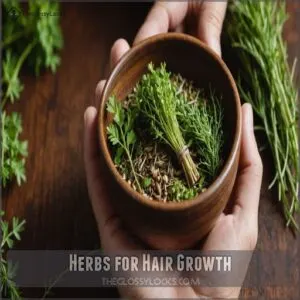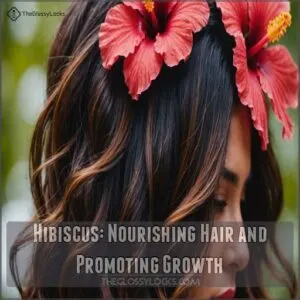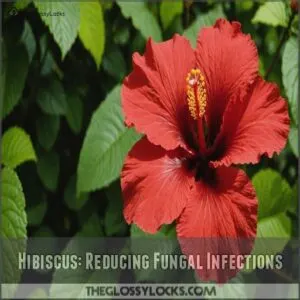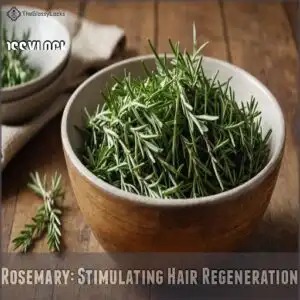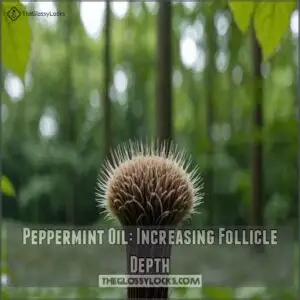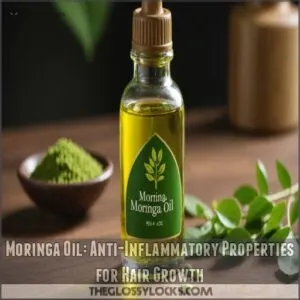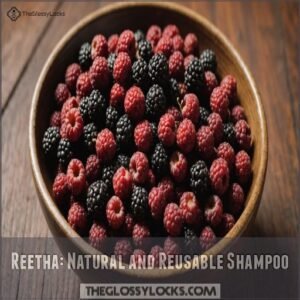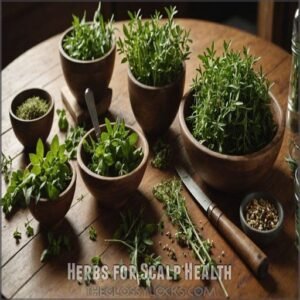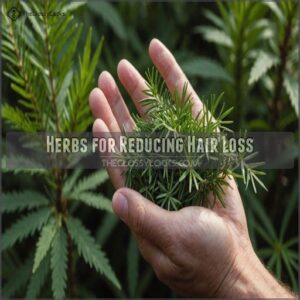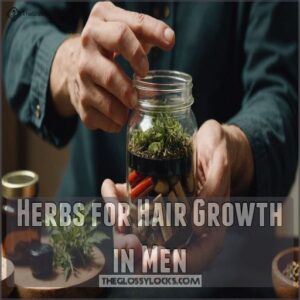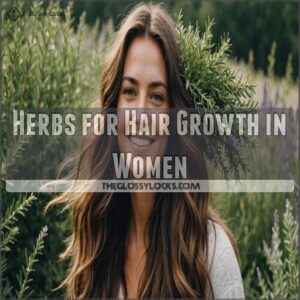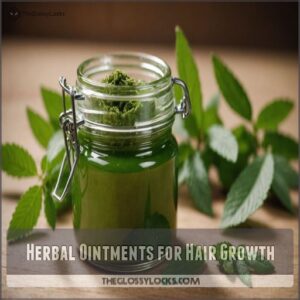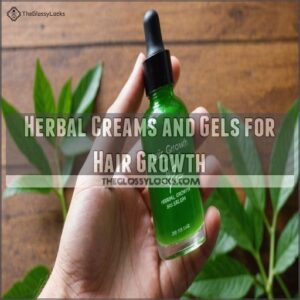This site is supported by our readers. We may earn a commission, at no cost to you, if you purchase through links.
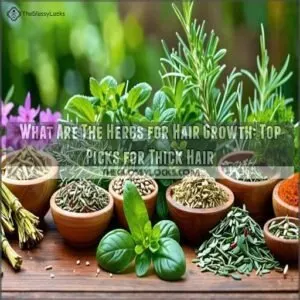 If you’re pondering "what are the herbs for hair growth," you’re in luck!
If you’re pondering "what are the herbs for hair growth," you’re in luck!
A variety of herbs have properties that can nurture your mane into luscious tresses.
Thyme and horsetail bring antimicrobial benefits, great for scalp health, while boosting thickness with silica.
Burdock offers antioxidants, and ginkgo biloba can improve blood flow to your follicles—think of it as getting your hair a gym membership!
Meanwhile, Ayurvedic herbs like hibiscus and amla provide Vitamin C, promoting growth.
Whether you’re battling thinning hair or just seeking stronger strands, these herbal powerhouses might be your ticket to a vibrant, thick head of hair.
Curious for more?
Table Of Contents
- Key Takeaways
- Herbs for Hair Growth
- Ayurvedic Herbs for Hair Growth
- Herbs for Hair Thickness
- Herbs for Scalp Health
- Herbs for Reducing Hair Loss
- Herbs for Hair Growth in Men
- Herbs for Hair Growth in Women
- Herbal Ointments for Hair Growth
- Herbal Creams and Gels for Hair Growth
- Frequently Asked Questions (FAQs)
- Are herbs good for hair growth?
- What works best for hair growth quickly?
- Which herbs are good for hair growth in Ayurveda?
- What herbs are good for hair growth & thickness?
- What is a good root for hair growth?
- What herbs are good for hair loss?
- What is the best herb for hair growth?
- What plant grows hair faster?
- Which herb is the king of hair growth?
- How do you combine herbs for hair growth?
- How do herbal oils promote hair growth?
- Can herbal teas help improve hair strength?
- Are there side effects of using herbs?
- Which herbs support hair regrowth after chemotherapy?
- Do herbal supplements actually enhance hair density?
- Conclusion
Key Takeaways
- You can use herbs like rosemary, thyme, and horsetail to improve scalp health and promote hair growth.
- Ayurvedic herbs such as hibiscus and amla offer vitamin C and other nutrients that support hair growth and strength.
- Herbs like ginkgo biloba and ginseng improve blood circulation to the scalp, nourishing hair follicles.
- Many herbs, including saw palmetto and stinging nettle, can help reduce hair loss.
Herbs for Hair Growth
If you’re on a quest to boost your hair health, turn to nature’s own apothecary.
Herbs like thyme, horsetail, and ginkgo biloba offer promising benefits for promoting thicker and healthier hair through their unique properties.
Thyme: Antimicrobial and Antioxidant Properties
Many swear by thyme’s benefits for hair health.
This amazing herb boasts antimicrobial action, fighting scalp infections that can hinder hair growth.
Its antioxidant properties protect hair follicles from damage, promoting a healthier scalp.
Adding thyme to your natural remedies routine might just be the key to achieving thicker, stronger hair.
Consider incorporating thyme oil into your scalp care regimen.
Research shows promising results for thyme as one of the best hair growth herbs.
Horsetail: Rich in Silica for Thicker Hair
Ever thought about where to find thicker hair secrets?
Horsetail, packed with silica, might just be your answer.
Silica benefits are the real deal; they strengthen hair, combat silica deficiency, and boost growth.
If you’re eyeing horsetail supplements, they can support hail health, giving you control over your locks.
Explore the herbs game, and watch your hair thrive!
Burdock: Antioxidants for Hair Health
Burdock root‘s packed with antioxidants that tackle oxidative stress, a major culprit in hair loss.
Imagine your hair a thirsty plant; burdock’s the nourishing rain.
Regularly using a burdock root tea rinse for hair can stimulate blood circulation to hair follicles.
Whether you’re sipping burdock tea for hair or massaging in burdock oil, it replenishes your locks’ energy.
Think of burdock shampoo benefits as a gentle hug for hair health, encouraging luscious growth.
Ginkgo Biloba: Improved Blood Circulation
Imagine boosting your hair’s health with ginkgo biloba.
This herb, often compared to minoxidil, is famous for enhancing blood circulation to your scalp.
You can find ginkgo biloba products designed for scalp care treatment that can help you get started.
Improved blood flow nourishes hair follicles, potentially reducing hair loss and promoting growth.
With ginkgo biloba in your corner, you might give those follicles the freedom to flourish.
Here’s to a healthier scalp and thicker hair!
Brahmi: Activating Hair Growth Proteins
If you’re curious about going beyond Ginkgo and tackling hormones’ effects, Brahmi might be your ticket.
This ancient herb is said to activate hair growth proteins, helping your locks gain that lush volume.
Think of it as nature’s way of boosting your hair’s potential, with studies showing its promise against hair loss.
Try Brahmi hair oil for a practical approach to thicker hair.
Ayurvedic Herbs for Hair Growth
In Ayurveda, certain herbs have been cherished for centuries for their potential to nourish hair and promote growth.
You’ll find familiar names like hibiscus, which offers dual benefits of strengthening hair and reducing pesky fungal infections, and amla, packed with vitamin C to stimulate healthy growth.
Hibiscus: Nourishing Hair and Promoting Growth
Nourishing your hair with hibiscus can feel like giving it a spa day.
Hibiscus hair masks and oils are packed with goodness that helps in hair growth and fights hair loss, which can be particularly helpful for those experiencing hair loss due to stress.
Imagine stealing a color boost from hibiscus tea for hair, adding that extra shine and depth.
Embrace this herb’s charm and watch your hair flourish.
Curry Leaves: Antioxidants for Hair Health
From hibiscus’s hair-boosting power, let’s move to another Ayurvedic star: curry leaves.
These aren’t just for flavorful dishes; they’re packed with antioxidants.
Antioxidants fight damage to your hair follicles, promoting healthy growth.
A healthy scalp equals healthy hair.
Adding curry leaves to your diet or using them in hair oils, which can be made by following the guide on how to make curry leaves oil for hair growth, might help reduce hair loss and improve overall hair health.
It’s a natural way to boost your hair’s defenses.
Hibiscus: Reducing Fungal Infections
Got dandruff? Hibiscus might just be your scalp’s secret weapon.
Beyond its vibrant look, this herb fights fungal infections, keeping your scalp healthy and itch-free.
Think of it as a gentle bouncer for your hair—naturally kicking out troublemakers.
Embrace hibiscus in your hair care routine for luscious locks without the need for over-the-counter itch creams.
Total scalp freedom!
Amla: Stimulating Hair Growth With Vitamin C
If you’re seeking a natural boost for your hair, consider amla.
Packed with vitamin C, amla benefits your hair by stimulating hair follicles and promoting growth.
Think of it as nature’s way of giving your hair a spotlight moment.
Whether it’s using an amla hair mask or amla supplements, consider this herb your ticket to shine and energy.
Herbs for Hair Thickness
When you’re on a quest for thicker hair, herbs like rosemary, peppermint oil, and moringa offer promising benefits backed by science.
With their natural properties enhancing follicle depth and promoting hair regeneration, these herbs can be your botanical allies in achieving luscious locks.
Rosemary: Stimulating Hair Regeneration
Ever wondered how rosemary could transform your hair?
This humble herb, praised for its stimulating effects, may just be your ticket to thicker hair.
Rosemary oil is believed to enhance the hair growth cycle by increasing blood circulation to hair follicles.
Forget those pricey solutions—DIY rosemary oil could be your budget-friendly alternative.
Consider rosemary as nature’s answer to minoxidil.
Peppermint Oil: Increasing Follicle Depth
Switching gears from rosemary, let’s chat about peppermint oil.
This oil isn’t just for freshening up your breath; it also works wonders on your scalp.
Peppermint oil can boost hair density by promoting deeper hair follicle growth.
Imagine your hair roots digging in like tree roots after a rainstorm—sturdy and ready to flourish.
Say goodbye to hair loss woes!
Moringa Oil: Anti-Inflammatory Properties for Hair Growth
Wrapping up peppermint’s magic, let’s chat about moringa oil.
It’s not just a smoothie ingredient!
Packed with anti-inflammatory power, moringa aids hair growth by soothing scalp inflammation and supporting healthy hair follicles, much like other natural remedies such as mehndi for hair growth, which strengthens hair follicles and promotes thicker and healthier hair growth.
Here’s why you’ll love it:
- Reduces scalp irritation
- Supports follicle health
- Certain essential oils, like rosemary, lavender, and peppermint, stimulate the scalp and promote hair growth with oils. Boosts hair growth naturally
Give it a shot and let your hair thrive!
Reetha: Natural and Reusable Shampoo
Moringa oil’s anti-inflammatory powers are great, but let’s talk about reetha.
This natural shampoo is a sustainable choice, offering a gentler clean than many soaps.
Reetha’s history stretches back centuries, and its benefits for hair growth are well-documented.
A simple reetha recipe involves boiling the dried berries.
This creates a lather that cleanses and conditions, leaving hair shiny and healthy.
Compared to soap, reetha is kinder to your scalp and hair.
Herbs for Scalp Health
Boosting scalp health is essential if you want to maintain thick, vibrant hair, and certain herbs can offer effective support.
Aloe vera, neem, and calendula can soothe irritation and reduce scalp infections, setting the stage for ideal hair growth.
Aloe Vera: Soothing The Scalp
Looking for a natural way to soothe your scalp and boost hair health?
Aloe vera might just be your herb of choice.
Known for its calming and anti-inflammatory properties, it can reduce dandruff and enhance overall scalp health.
Say goodbye to itchiness, which turmeric can help alleviate through its anti-inflammatory and antioxidant properties, particularly when used in a turmeric hair growth treatment. Say goodbye to itchiness and embrace healthier hair growth.
Aloe vera keeps your hair in check while giving your scalp the love it deserves.
Neem: Reducing Scalp Infections
After soothing your scalp with aloe vera, you might wonder how to keep infections at bay, also considering medicated shampoos with zinc pyrithione benefits.
Enter neem—your green knight fighting off pesky scalp invaders.
Neem oil benefits for scalp health are profound, acting like a fortress shielding against infections.
Try DIY neem treatments for tackling hair loss causes naturally.
Neem: a small herb, massive impact!
Calendula: Stimulating Hair Growth
Calendula steps into the spotlight, showing off its knack for scalp care.
Picture it like a gentle hug for your hair follicles, encouraging them to bloom.
Its anti-inflammatory powers help soothe the skin while keeping myths about hair growth at bay.
Try DIY calendula oil or a hair mask, and watch your hair thank you with new vigor.
Herbs for Reducing Hair Loss
You’re probably tired of seeing hair in the shower drain, but don’t lose hope just yet.
By understanding how herbs like saw palmetto and stinging nettle work to reduce hair loss, you can help your hair regain its former glory with minimal fuss.
Saw Palmetto: Inhibiting DHT Conversion
Scalp health is key to hair vitality.
For tackling hair loss, saw palmetto shines by inhibiting DHT conversion—a top culprit in androgenetic alopecia.
Think of DHT as a sneaky hair thief; saw palmetto acts like a bouncer, keeping it in check.
This natural DHT inhibitor offers a hopeful alternative treatment for promoting hair growth.
Stinging Nettle: Reducing Hair Loss
Want thicker, healthier hair? Stinging nettle might be your secret weapon.
This herb’s known for its ability to combat hair loss.
Nettle’s rich in vitamins and minerals that nourish hair follicles.
You can find nettle in teas, supplements, or oils.
Many swear by nettle tea for hair, claiming it strengthens strands.
Scientific studies are ongoing, but anecdotal evidence is promising.
Give stinging nettle a try—your hair might thank you!
Wild Basil: Promoting Hair Growth
Wild basil, a secret ally in the battle against hair loss, can be part of your hair care routine.
Known for its potential to stimulate hair follicles, wild basil oil or supplements might be your next go-to for encouraging luscious locks.
Unlike some remedies, this herb offers a unique approach on promoting growth, making it worth a try.
Herbs for Hair Growth in Men
If you’re concerned about hair growth, certain herbs might hold the secret to thicker hair locks.
From Korean Red Ginseng to Ginkgo Biloba, these natural remedies can stimulate growth and improve circulation, promising a fuller head of hair.
Korean Red Ginseng: Stimulating Hair Growth
Korean red ginseng could be your hair’s best buddy!
Known for stimulating hair follicles, this herb often steals the spotlight in hair growth studies.
It’s like nature’s little secret weapon against hair loss.
While dosing varies, starting with a small amount and consulting your doctor is smart.
Tap into the benefits of ginseng for healthier, thicker hair.
Ginkgo Biloba: Improving Blood Circulation
Boost your hair health with ginkgo biloba, a powerhouse herb known for improving blood circulation and supporting hair growth.
It enhances oxygen flow to the scalp like a well-oiled machine, promoting healthier follicles.
Think of it as giving your hair roots a revitalizing spa day.
- Rich in antioxidants
- Supports blood flow
- May improve hair thickness
- Natural alternative to minoxidil
Jasmine: Promoting Hair Growth
Amid your quest for lush locks, Jasmine stands out as a natural ally.
This fragrant flower doesn’t just smell heavenly; studies suggest it may support hair growth by nourishing hair follicles and reducing hair loss, particularly through the promotion of healthy keratin production, which is influenced by factors like diet, stress, and genetics.
Try a Jasmine hair mask or Jasmine hair oil for a soothing treatment.
Embrace the floral boost and let your hair thrive naturally!
Herbs for Hair Growth in Women
Regarding hair growth in women, herbs like rose petals and onion juice offer promising benefits.
Rose petals boast anti-inflammatory properties that can soothe your scalp.
Onion juice is known to stimulate new hair growth naturally.
Rose Petals: Anti-Inflammatory Properties
Often, you’ll find rose petals touted for their hair benefits.
These delicate petals possess impressive anti-inflammatory properties, beneficial for scalp health.
Inflammation can hinder hair growth; rose petals may help.
Here’s what you should know:
- Rose petals soothe irritated scalps.
- Their antioxidants combat damage.
- Reduced inflammation promotes healthy hair growth.
Using rose petals as a natural remedy can be a gentle approach to improving your hair.
Onion Juice: Stimulating Hair Growth
Shifting from rose petals’ soothing magic, let’s chat about onion juice—a quirky but potent remedy for hair growth.
It’s packed with sulfur, igniting your hair follicles and encouraging growth while boosting scalp health.
Here’s a DIY secret: massage it in, laugh at the smell, and watch your hair thrive!
| Benefit | Description |
|---|---|
| Sulfur-rich | Aids in hair growth |
| Follicle booster | Stimulates follicles |
| Scalp care | Enhances health |
| DIY-friendly | Easy to use at home |
Herbal Ointments for Hair Growth
You’re not alone if you’re searching for an easy way to nourish your hair and improve scalp health—herbal ointments made with Gooseberry and Gotu Kola might just do the trick.
These natural ingredients are combined with oils or waxes to create a soothing ointment that helps support hair growth while keeping your scalp happy and healthy.
Gooseberry: Promoting Hair Growth
After exploring herbs for women like onion juice, let’s focus on gooseberry—often hailed for its hair-boosting magic.
Known also as amla, it packs a punch in hair growth: You can find a range of products formulated to harness its power, like those offered on a website dedicated to gooseberry hair growth.
- Stimulates hair follicles: Encourages growth and strength.
- Rich in vitamin C: Fights oxidative stress affecting your scalp.
- DIY remedies: Try amla oil for a natural boost.
Who wouldn’t want luscious locks?
Gotu Kola: Improving Scalp Health
While gooseberry’s been rallying for your hair’s health, Gotu kola steps up as the soothing hero your scalp’s been waiting for.
Known for its skin-rejuvenating skills, it tackles scalp inflammation and boosts circulation, giving you the freedom to worry less about hair loss.
Picture it like a calm garden for your head, silently nurturing those follicles back to life.
Herbal Creams and Gels for Hair Growth
You might be surprised to learn that herbal creams and gels can promote hair growth with the help of some powerful ingredients.
With herbs like Giant Dodder, Bitter Apple, and False Daisy, these topical solutions stimulate growth and reduce inflammation to help you achieve thicker hair.
Giant Dodder: Stimulating Hair Growth
Giant Dodder is grabbing attention in hair growth studies for its potential to stimulate hair follicles, similar to how essential oils like rosemary oil stimulate new hair growth.
Found in various Dodder hair products, it’s often compared to minoxidil.
While research shows promise, its effects aren’t guaranteed.
Keep an eye out for any dodder side effects, but it could be your hair’s new best friend.
Bitter Apple: Promoting Hair Growth
Moving on from giant dodder, let’s talk about bitter apple.
This herb shows promise in promoting hair growth, although more studies are needed.
Some believe its benefits stem from stimulating hair follicles.
It’s often found in herbal creams and gels designed to combat hair loss.
If you’re exploring natural remedies for alopecia or general hair growth, ginger has been considered a natural remedy that may promote stronger, longer hair and reduce hair loss through its benefits such as ginger hair growth properties. If you’re exploring natural remedies for alopecia or general hair growth, it’s worth researching.
Remember to consult a doctor before trying any new herbal remedy.
False Daisy: Anti-Inflammatory
After Bitter Apple’s hair-promoting kick, False Daisy steps in to wow with its anti-inflammatory charm.
This herb is a top pick for boosting scalp health and nurturing those hair follicles.
You can incorporate False Daisy into your hair care routine through products like False Daisy Hair Gel.
Here’s how it helps:
- Reduces scalp inflammation: Calm your scalp, encourage growth.
- Strengthens hair roots: Say goodbye to hair loss!
- Revitalizes shine: Gleam like never before.
Frequently Asked Questions (FAQs)
Are herbs good for hair growth?
Herbs like rosemary, ginseng, and peppermint oil can boost hair growth by stimulating follicles and improving circulation.
Rosemary, ginseng, and peppermint oil might help reduce hair loss and enhance thickness.
Using these in hair care routines might help reduce hair loss and enhance thickness, though results can vary individually.
What works best for hair growth quickly?
Think of hair growth like planting a garden — patience helps.
Scalp massage boosts blood flow, rosemary oil stimulates follicles, and biotin strengthens hair.
Don’t pull your hair out — consistency and time are key for results.
Which herbs are good for hair growth in Ayurveda?
Ayurveda suggests several herbs for hair growth. Try amla, brahmi, and bhringraj. These promote healthy follicles and strong strands. Remember, consistent use is key!
What herbs are good for hair growth & thickness?
Imagine your hair growing like a lush, thick forest!
Aloe vera, rosemary, and peppermint oil are fantastic allies for hair growth and thickness.
They’re backed by science, soothing your scalp and fostering robust hair health.
What is a good root for hair growth?
Ginseng roots are great for hair growth.
They’re known to boost hair follicles and prevent hair loss.
Imagine these roots working like nature’s little head massage, prompting those lazy follicles to wake up and grow.
What herbs are good for hair loss?
Try using herbs like saw palmetto, rosemary, peppermint oil, lavender, and ginseng for hair loss.
They might boost hair growth and follicle health.
Lavender even makes your scalp smell great while working its magic.
What is the best herb for hair growth?
Rosemary might just be your go-to herb for hair growth.
Studies suggest it can boost hair regrowth, much like a 2% minoxidil solution.
Plus, it’s easy to use, just like adding a sprinkle of magic to your routine.
What plant grows hair faster?
You might find peppermint oil increases hair growth.
It boosts follicle density and depth, sometimes more effectively than minoxidil.
Apply consistently, like a gardener tending to seeds, to see your hair flourish over time.
Which herb is the king of hair growth?
Guess what herb folks often crown the king of hair growth?
It’s ginseng!
Known for its power to stimulate follicles and prevent hair cell death, ginseng can give your mane that extra boost of energy.
How do you combine herbs for hair growth?
Experiment with blends!
Start with a base oil like coconut or jojoba.
Then, add a few drops of essential oils—rosemary, lavender, peppermint—for their hair-growth benefits.
Mix well and gently massage into your scalp.
How do herbal oils promote hair growth?
Herbal oils bolster hair growth by improving blood circulation to hair follicles, nourishing them with essential nutrients.
They boost follicle health and stimulate cells responsible for hair regeneration.
Think of it like a spa day for your scalp!
Can herbal teas help improve hair strength?
Imagine your hair as a garden; nourishing it with herbal teas like rosemary, nettle, and horsetail might strengthen roots and promote growth.
These teas can provide essential nutrients and antioxidants that support hair health.
Are there side effects of using herbs?
Using herbs for hair growth can cause side effects like skin irritation or allergic reactions.
Always test a small skin patch first.
If something feels off, stop using it and talk to a healthcare professional.
Which herbs support hair regrowth after chemotherapy?
Understanding hair regrowth like a seasoned sailor after chemotherapy, reach for ginseng, peppermint oil, and rosemary.
They stimulate follicles and enhance blood circulation, helping your hair anchor securely as it sets sail for a healthy comeback.
Do herbal supplements actually enhance hair density?
Herbal supplements like saw palmetto, ginseng, and rosemary oil can potentially enhance hair density by stimulating hair follicles and improving circulation.
Herbal supplements can potentially enhance hair density.
However, more human studies are needed to confirm their effectiveness.
Always consult your doctor before starting any supplement.
Conclusion
Keep your hair game on point with the right herbs.
If you’re wondering what’re the herbs for hair growth, consider thyme, horsetail, and burdock for their scalp-boosting benefits.
Ayurvedic choices like hibiscus and amla add another layer of nourishment.
For men and women alike, using herbs like ginseng and rose petals can give your hair a healthy kick.
Incorporate these natural wonders into your routine and watch your hair transform into the luscious locks you’ve always wanted.

